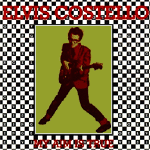 |
 |
|
|
|
| |||
 Elvis Costello
Elvis CostelloMy Aim is True [Rhino] Rating: 9.8 Once upon a time, being a bitter, frustrated male musician didn't mean being a jerkass. Perpetually wronged and rarely laid men were capable of being intelligent about their bitterness, focusing their anger not on the whole of womankind, but on particular women (usually flirts and teases) and attacking these women with a potent blend of wit and bile. Rather than self-aggrandizement, self-deprecation reigned supreme. More importantly, subtlety won out over blatant self-pity or obnoxiousness. Yeah, these gentlemen were angry, but they were smart enough to know what they were angry at-- and geeky enough to include themselves in that category. At the helm of this trend towards new-wave geekdom was Stiff Records, a small label operating out of England with a roster including Ian Dury, Nick Lowe, and the mighty Elvis Costello. With his 1977 debut, My Aim is True, Costello exploded onto the punk/new-wave scene like a mutant hybrid of Buddy Holly and Johnny Rotten. He had the seething contempt of a punk, but a transparent intelligence, sensitivity, and melodic sense that made him much more interesting than many of his contemporaries. Punks didn't give a fuck; Elvis was sensitive enough to not only give a fuck, but smart enough to be pissed off and disturbed by that fuck. On My Aim is True, Elvis' raw energy comes through in a way that's never completely recaptured on later records. While the songs range from mellow country twang to full-on, spitting assault, there's a strange cohesiveness to the album simply by virtue of its rough, rushed feel. Although it's a studio album, there's a latent energy to Nick Lowe's production that grants My Aim is True all the immediacy of a live show. While Lowe's blunt production certainly enhances the record, the real star here, naturally, is Elvis himself. My Aim is True is host to some of the best songs Elvis has ever penned. The brief kick in the balls of the opening track, "Welcome to the Working Week," is perhaps the album's perfect mission statement. With poppy ooh's, a catchy melody, and an undeniably sharp edge, the song excellently captures the cyanide-laced slab of peanut brittle that is Elvis. The lyrics are rife with brilliant, subtle innuendo. From the opening line, "Now that your picture's in the paper/ Being rhythmically admired," it's clear that Costello isn't going to stumble into any cheap lyrical traps. A lesser man would have just used some goofy synonym for masturbation; Elvis went and used the phrase "rhythmically admired." It's more subtle, more original, and infinitely cooler. That's why you love him. "Miracle Man," "No Dancing," and "Blame It on Cain" bring the album down a notch with an off-kilter punky-tonk feel. "No Dancing," the highlight of the three, introduces a Phil Spector-style effect of massive percussion and multitracked vocals. "Blame It on Cain," a typically Costello-ish tale of dissatisfaction, swaggers with twangy country guitar and pained vocals. Clover guitarist John McFee, whose guitar stylings accentuate "Blame It on Cain," makes his grandest statement on the album's next track, "Alison." Besides being one of the great melancholy pop songs of all time, "Alison" is the finest example of Costello doublespeak to be found anywhere in his catalog. When Elvis sweetly intones, "My aim is true," he could as easily be alluding to shooting his ex-lover as trying to win her back. Lines like, "Sometimes I wish that I could stop you from talking/ When I hear the silly things that you say," are far too loaded and complex to be written off as simple aggression. A similar blend of pop, bitterness, and convoluted imagery comes with "(The Angels Wanna Wear My) Red Shoes," the catchiest pop song on My Aim is True, and home to the immortal line, "I said I'm so happy I could die/ She said 'drop dead' and left with another guy." "Less Than Zero," a charming ditty about a British fascist, appears in two forms on this reissue-- the original album cut, and a live "Dallas" version, in which Costello brilliantly twists the lyrics to focus on Kennedy assassin Lee Harvey Oswald, rather than the aforementioned fascist Oswald Mosley. While every track on My Aim is True is great, "Watching the Detectives" closes the album at its highest point. A reggae-flavored nod to film noir, the song rumbles with style and force. Elvis' nerdy whine sounds wonderfully displaced amidst the heavy bass and syncopated drumming, and perfectly ties up the vague themes of love and murder running through the record. This new reissue by Rhino allows My Aim is True to end with "Watching the Detectives," cramming all the bonus tracks onto an extra CD. The bonus tracks themselves are almost identical to those found on the previous Rykodisc reissue, with the addition of the "Dallas" version of "Less Than Zero" from the Live at El Mocambo disc, and previously unreleased, early versions of "No Action" and "Living in Paradise," which both sound excellent. Indeed, these early editions of later Costello songs nicely demonstrate the tradeoffs that occur with later albums. While these versions don't sound as smooth or as distinctively Costello-ish as the later ones, they pack an energy and punch that, in some ways, encapsulates Elvis' intensity better than later renditions. But rather than being gratuitously hateful or aggressive, Elvis treats his bitterness like a fine wine, letting a complex bouquet of anger, doubt, and pity shine through. Wordy, witty, and geeky as fuck, My Aim is True is without question one of the finest statements of brilliant nerddom ever to be released.
|
|||

